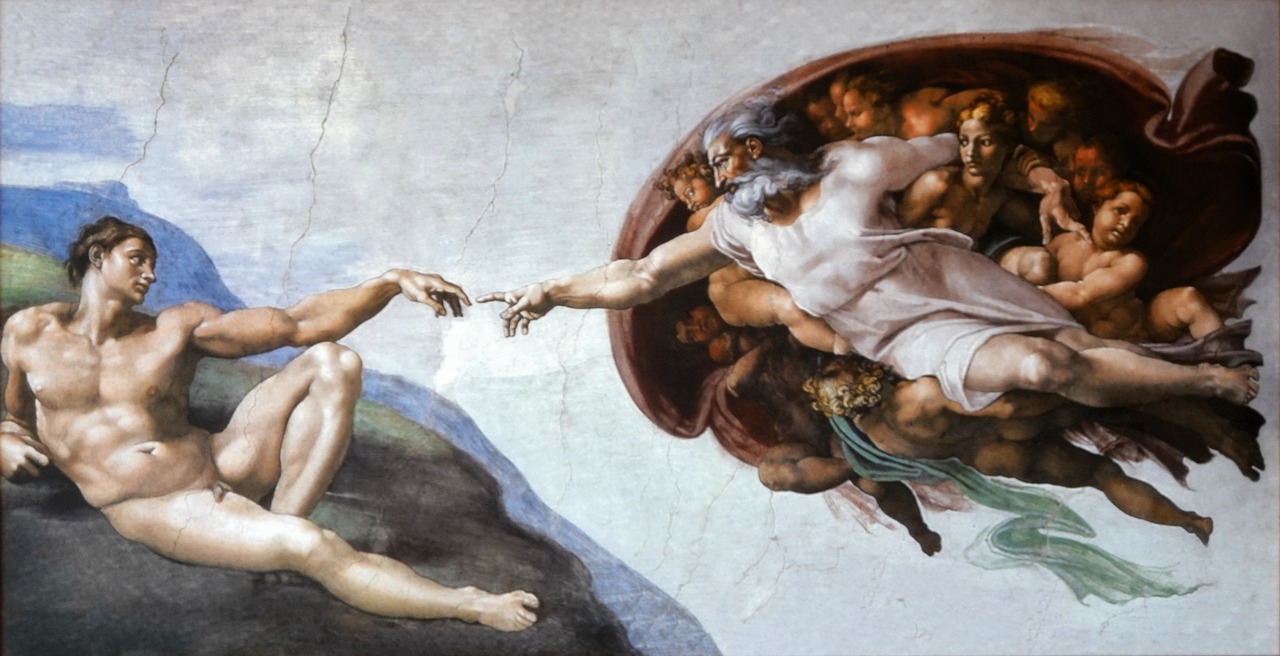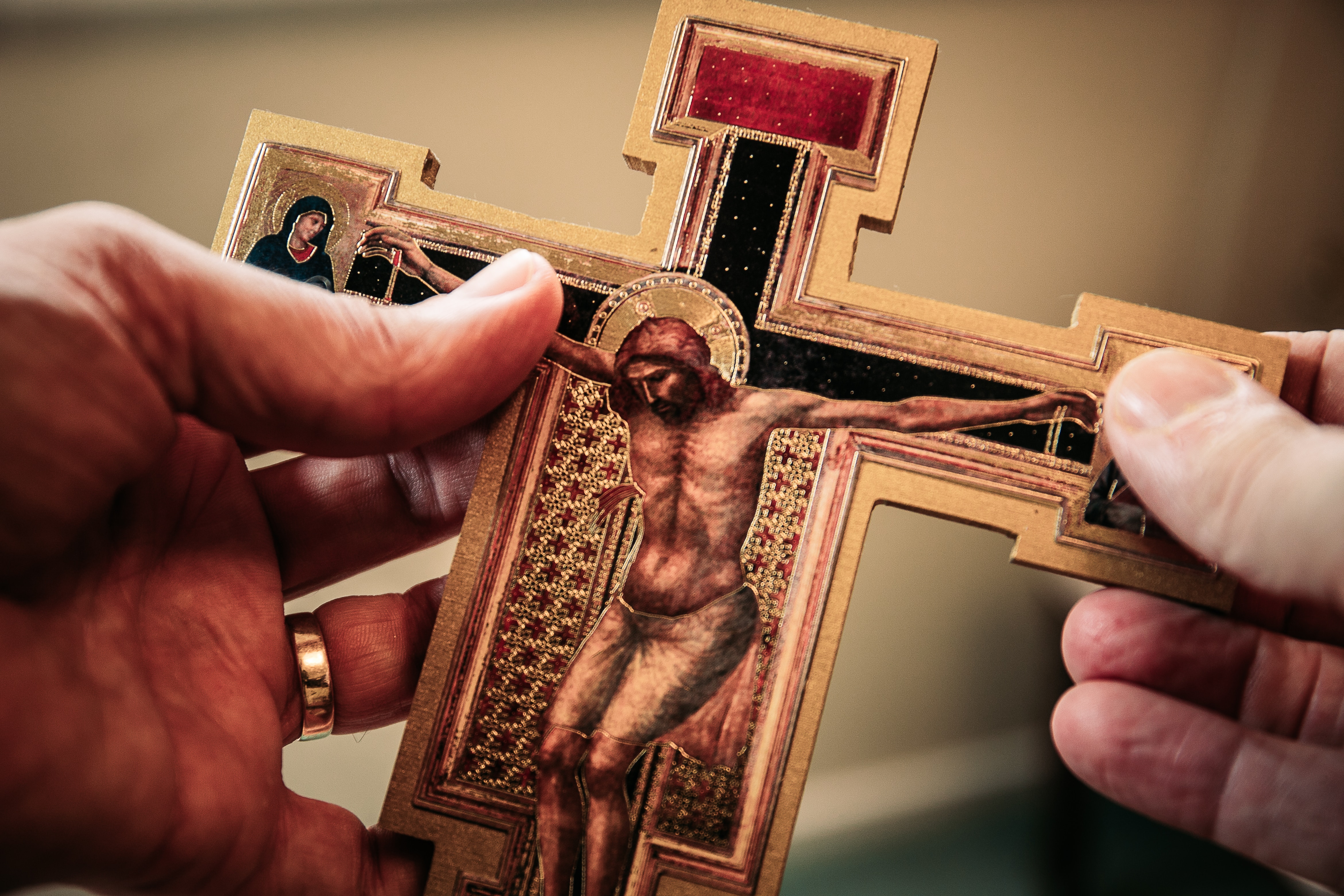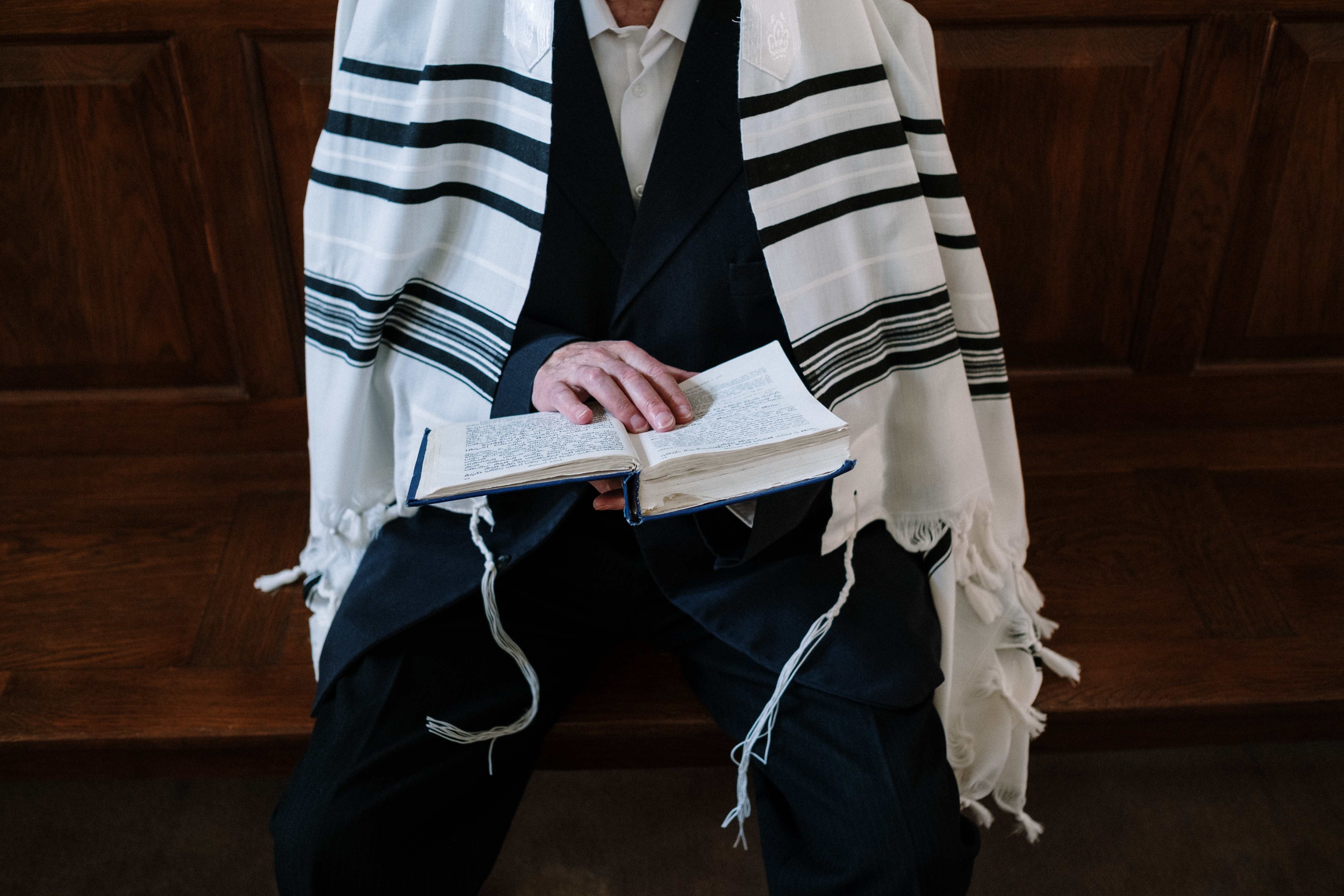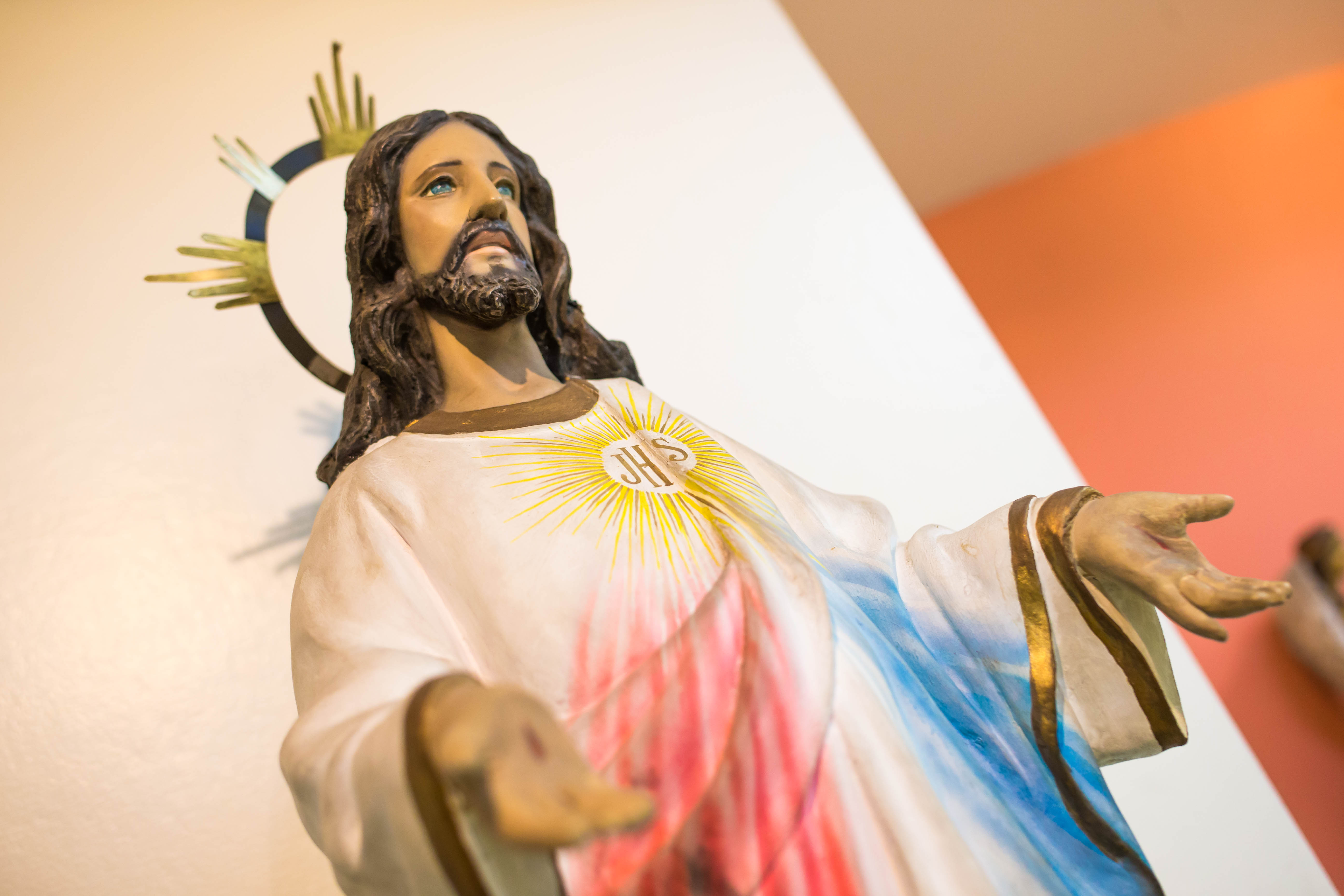Jesus tells the scribes that the first among all the commandments is to love God with all our heart, soul, mind, and strength. What presently has your heart and soul? What is occupying your mind and sapping your strength? “The second is this: ‘You shall love your neighbor as yourself.’”
How can we love God with all our hearts when we are surrounded by so many others we love? We struggle to give all to the Unseen while looking upon the many faces needing our love. The people in our home, extended family, community, and even workplace we know need our attention; are we not to love them as well? Has God not created us out of love and with enough love to give our hearts entirely to everyone? Any mother can tell you her love has no limits. It does not deplete with each new child; it multiplies. How much more does our ability to love expand when we first extend it all to our Heavenly Father?
Maybe even more challenging is the idea of loving our neighbor as ourselves. What does that look like? In some aspects, it depends on how we love ourselves. Though at our core, everyone desires the most basic needs—comfort, financial stability, being valued, friendship, and safety for our family and our world. Is it so difficult to want this for others as well? To love others as ourselves is to take part in assuring that every person – even those who are the most difficult to love – are fed, clothed, and are not thirsting for water, knowledge, or spiritual things.
Perhaps it seems impossible on some levels to love an invisible God above all else and to love even our enemies as ourselves. Still, we know God never asks the impossible. His grace makes the impossible possible. Grace overcomes our human limitations. God’s holy Spirit within us — that is grace! Grace changes us; it transforms our weaknesses into the extraordinary. Without grace, we cannot accomplish the sanctifying things God asks of us. He is so generous in giving us direction along with the ability to do it. If there is a struggle, it is because we fail to believe and trust in God entirely. We believe enough to want to please him, then forget to use this Faith to accomplish what God has asked us to do.
The incredible thing is that when we live in a relationship with God and work to imitate Jesus, giving all, including loving our neighbor like ourselves, becomes seamless. If we truly believe God is who He says He is, then we also believe He deserves the highest place in our heart, mind, soul, and strength. If we give Him all, we will naturally love our neighbors; we’ll see them with the eyes of God, recognizing that they, too, are made in His image and likeness, fearfully and wonderfully made.
Jesús les dice a los escribas que el primero de todos los mandamientos es amar a Dios con todo el corazón, alma, mente y fuerzas. ¿Qué contienen actualmente tu corazón y tu alma? ¿Qué ocupa tu mente y mina tus fuerzas? “El segundo es éste: ‘Amarás a tu prójimo como a ti mismo.'”
¿Cómo podemos amar a Dios con todo el corazón cuando estamos rodeados de tantas personas que amamos? Luchamos por darlo todo al Invisible mientras contemplamos los muchos rostros que necesitan de nuestro amor. Las personas en nuestro hogar, familia extendida, comunidad e incluso lugar de trabajo que sabemos que necesitan nuestra atención; ¿No debemos amarlos también a ellos? ¿No nos ha creado Dios por amor y con suficiente amor para entregar nuestro corazón enteramente a todos? Cualquier madre puede decirte que su amor no tiene límites. No se agota con cada nuevo hijo; se multiplica. ¿Cuánto más se expande nuestra capacidad de amar cuando la extendemos por primera vez a nuestro Padre Celestial?
Quizás aún más desafiante sea la idea de amar al prójimo como a nosotros mismos. ¿Cómo se hace eso? En algunos aspectos, depende de cómo nos amamos a nosotros mismos. Aunque en el fondo, todos deseamos las necesidades más básicas: comodidad, estabilidad financiera, ser valorados, amistad y seguridad para nuestra familia y nuestro mundo. ¿Es tan difícil querer esto también para los demás? Amar a los demás como a nosotros mismos es participar en asegurar que cada persona -incluso aquellas que son más difíciles de amar- esté alimentada, vestida y no tenga sed de agua, conocimiento o cosas espirituales.
Quizás parezca imposible de algunas formas amar a un Dios invisible por encima de todo y amar incluso a nuestros enemigos como a nosotros mismos. Aún así, sabemos que Dios nunca pide lo imposible. Su gracia hace posible lo imposible. La gracia supera nuestras limitaciones humanas. El Espíritu Santo de Dios habita en nosotros: ¡eso es gracia! La gracia nos cambia; transforma nuestras debilidades en lo extraordinario. Sin gracia, no podemos lograr las cosas santificadoras que Dios nos pide. Él es muy generoso al darnos dirección junto con la capacidad para hacerlo. Si batallamos, es porque no creemos ni confiamos completamente en Dios. Creemos lo suficiente como para querer agradarle, pero luego nos olvidamos de usar la fe para lograr lo que Dios nos ha pedido que hagamos.
Lo increíble es que cuando vivimos en una relación con Dios y trabajamos para imitar a Jesús, darlo todo, incluso amar a nuestro prójimo como a nosotros mismos, se vuelve perfecto. Si realmente creemos que Dios es quien dice, entonces también creemos que merece el lugar más elevado en nuestro corazón, mente, alma y fuerzas. Si le damos todo, naturalmente amaremos al prójimo; los veremos con los ojos de Dios, reconociendo que ellos también están hechos a su imagen y semejanza, hechos de manera asombrosa y maravillosa.
 Allison Gingras ( www.ReconciledToYou.com ) — Shares her love of the Catholic Faith with stories, laughter, and honesty as experienced in the ordinary of life! Her writing includes Encountering Signs of Faith (Ave Maria Press) and the Stay Connected Journals for Women (OSV). Allison is a Catholic Digital Media Specialist for Family Rosary, Catholic Mom, and the Fall River Diocese. She hosts A Seeking Heart podcast and is co-host of the Catholic Momcast podcast.
Allison Gingras ( www.ReconciledToYou.com ) — Shares her love of the Catholic Faith with stories, laughter, and honesty as experienced in the ordinary of life! Her writing includes Encountering Signs of Faith (Ave Maria Press) and the Stay Connected Journals for Women (OSV). Allison is a Catholic Digital Media Specialist for Family Rosary, Catholic Mom, and the Fall River Diocese. She hosts A Seeking Heart podcast and is co-host of the Catholic Momcast podcast.Feature Image Credit: Stock Snap, pixabay.com/photos/people-friends-group-hands-signs-2608145/
The views and opinions expressed in the Inspiration Daily blog are solely those of the original authors and contributors. These views and opinions do not necessarily represent those of Diocesan, the Diocesan staff, or other contributors to this blog.


 Elizabeth Tomlin is the author of Joyful Momentum: Building and Sustaining Vibrant Women’s Groups and contributing author to the Ave Prayer Book for Catholic Mothers. She is General Counsel for the Archdiocese for the Military Services, USA. Elizabeth is an Army wife and mother of three and currently lives in the DC area. She blogs at
Elizabeth Tomlin is the author of Joyful Momentum: Building and Sustaining Vibrant Women’s Groups and contributing author to the Ave Prayer Book for Catholic Mothers. She is General Counsel for the Archdiocese for the Military Services, USA. Elizabeth is an Army wife and mother of three and currently lives in the DC area. She blogs at 
 Kate Taliaferro is an Air Force wife and mother. She is blessed to be able to homeschool, bake bread and fold endless piles of laundry. When not planning a school day, writing a blog post or cooking pasta, Kate can be found curled up with a book or working with some kind of fiber craft. Kate blogs at
Kate Taliaferro is an Air Force wife and mother. She is blessed to be able to homeschool, bake bread and fold endless piles of laundry. When not planning a school day, writing a blog post or cooking pasta, Kate can be found curled up with a book or working with some kind of fiber craft. Kate blogs at 




 Kathryn Mulderink, MA, is married to Robert, Station Manager for Holy Family Radio. Together they have seven children (including Father Rob), and seven grandchildren. She is President of the local community of Secular Discalced Carmelites and has published five books and many articles. Over the last 30 years, she has worked as a teacher, headmistress, catechist, Pastoral Associate, and DRE, and as a writer and voice talent for Catholic Radio. Currently, she serves the Church by writing and speaking, and by collaborating with various parishes and to lead others to encounter Christ and engage their faith. Her website is
Kathryn Mulderink, MA, is married to Robert, Station Manager for Holy Family Radio. Together they have seven children (including Father Rob), and seven grandchildren. She is President of the local community of Secular Discalced Carmelites and has published five books and many articles. Over the last 30 years, she has worked as a teacher, headmistress, catechist, Pastoral Associate, and DRE, and as a writer and voice talent for Catholic Radio. Currently, she serves the Church by writing and speaking, and by collaborating with various parishes and to lead others to encounter Christ and engage their faith. Her website is 
 Tami Urcia grew up in Western Michigan, a middle child in a large Catholic family. She spent early young adulthood as a missionary in Mexico, studying theology and philosophy, then worked and traveled extensively before finishing her Bachelor’s Degree in Western Kentucky. She loves tackling projects, finding fun ways to keep her little ones occupied, quiet conversation with the hubby and finding unique ways to love. She works full time, is a guest blogger on
Tami Urcia grew up in Western Michigan, a middle child in a large Catholic family. She spent early young adulthood as a missionary in Mexico, studying theology and philosophy, then worked and traveled extensively before finishing her Bachelor’s Degree in Western Kentucky. She loves tackling projects, finding fun ways to keep her little ones occupied, quiet conversation with the hubby and finding unique ways to love. She works full time, is a guest blogger on 
 Deanna G. Bartalini, M.Ed.; M.P.A., is a certified spiritual director, writer, speaker and content creator. The
Deanna G. Bartalini, M.Ed.; M.P.A., is a certified spiritual director, writer, speaker and content creator. The 



 David Dashiell is a freelance author and editor in Nashville, Tennessee. He has a master’s degree in theology from Franciscan University, and is the editor of the anthology
David Dashiell is a freelance author and editor in Nashville, Tennessee. He has a master’s degree in theology from Franciscan University, and is the editor of the anthology 